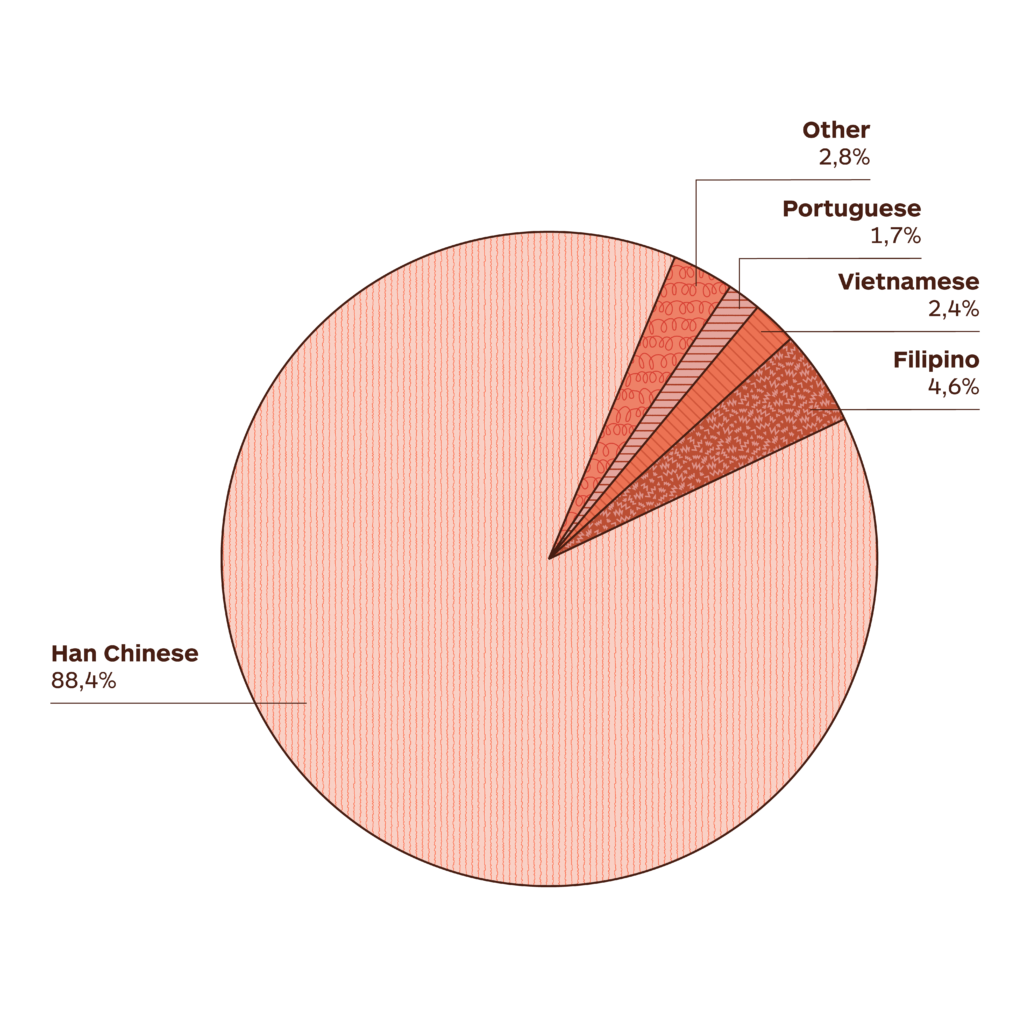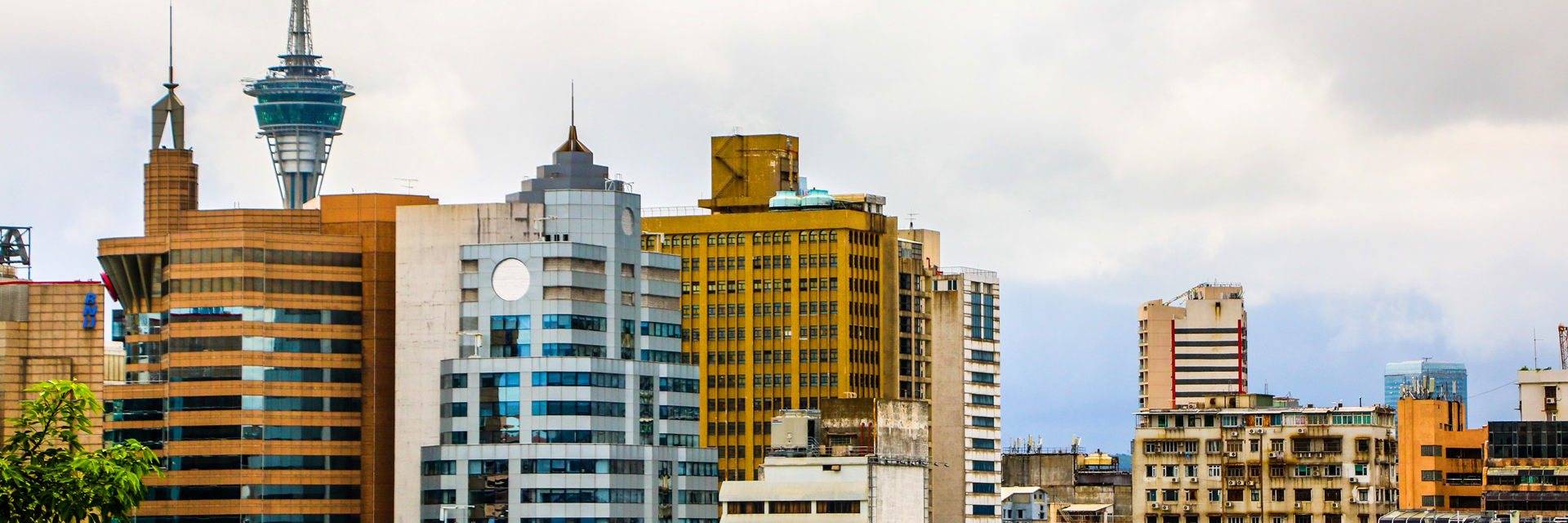Asia
To which language should you translate to localize in Macau?
What we know from our community
Macau’s linguistic heritage is closely interlinked with the city’s history as a former Portuguese colony. It has two official languages: Chinese and Portuguese. Macau Chinese, which utilizes standard written Chinese for formal written communication and Cantonese for spoken communication, is the language that closely connects with the Macanese. Cantonese is the most widely spoken language used in everyday life, while Portuguese having a significant presence in legal, governmental, and cultural contexts. With the influx of gaming finance into the city, English has also come to a role of increasing prominence especially in casino resorts and main tourist areas. There are also substantial number of Filipinos working in the city who speak Tagalog as their primary language.
In terms of writing system in Chinese, Cantonese Chinese in Macau uses traditional characters, similarly to Hong Kong, while Mandarin Chinese in Mainland China uses simplified characters. The Cantonese spoken in Macau also has a distinct accent and vocabulary compared to other Cantonese-speaking regions. It is also interesting to note that the language has a large number of loanwords from Portuguese, such as 馬介休 (‘bacalhau’), 葡萄牙 (‘Portugal’), and 前地 (‘largo’).
Traditional Chinese (Cantonese)
澳門的語言局面與其作為葡萄牙前殖民地的歷史密不可分。澳門有兩種官方語言:中文和葡文。
Piyen Ho, Translator
在正式書面交流中,澳門人會使用標準書寫中文;而在口語交流中,則使用廣東話。廣東話是澳
門日常生活中最廣泛使用的語言,而葡文在法律、政府和文化背景下佔有重要地位。隨著賭博娛
樂和金融業的湧入,英語在賭場、度假村酒店和主要旅遊區扮演着重要的角色。除此之外,亦有
大量的菲律賓人在澳門工作,他們會以他加祿語為主要語言。
在中文的書寫系統方面,澳門的廣東話使用繁體字,與香港一樣,而在中國大陸的普通話則使用
簡體字。澳門的廣東話口音和詞彙與其他廣東話使用地區也有所不同。有趣的是,澳門的廣東話
有許多來自葡萄牙語的借詞,例如「馬介休」(bacalhau)、「葡萄牙」(Portugal)和「前地」
(largo)。
LANGUAGE INSIGHT
Official language
Chinese (92%), Portuguese (2%)
Actual languages
Chinese (92.0%), English (2.3%), Portuguese (2%), Tagalog (1.7%), other (2.0%)
What the top 150 best localized websites in the world do in Macau
(Top 150 websites listed in the Global by Design ranking – published annually by Byte Level Research, this report provides a list of globally localized websites, showcasing best practices and emerging trends in their globalization)
- 18/150 localize by translating into Traditional Chinese
- 3/150 localize by translating into both Traditional Chinese and Portuguese
- 1/150 localizes by translating into both Simplified Chinese and Portuguese
- 1/150 localizes by translating into Simplified Chinese
- 1/150 localizes by translating into Traditional Chinese, Portuguese and Tagalog
- 1/150 localizes by translating into Traditional Chinese, Semplified Chinese, Portuguese, German, French, Spanish, Italian, Russian, Japanese and Korean
-
3M
-
ABB
-
Accenture
-
Adidas
-
Adobe
-
Airbnb
-
Aldi
-
Amazon
-
American Airlines
-
American Express
-
Apple
-
Audi
-
Autodesk
-
Avis
-
Bayer
-
BMW
-
Booking.com
-
Bosch
-
British Airways
-
Bumble
-
Burberry
-
BYD
-
Canon
-
Capgemini
-
Cartier
-
Caterpillar
-
Chevrolet
-
Cisco Systems
-
Citibank
-
Coca-Cola
-
Costco
-
Dell
-
Deloitte
-
Delta
-
DHL
-
Disney+
-
Dyson
-
eBay
-
Eli Lilly
-
Emirates
-
Ernst & Young
-
Facebook
-
FedEx
-
Ford
-
Four Seasons
-
Fujifilm
-
GE
-
Gillette
-
GoDaddy
-
Google
-
Gucci
-
Haier
-
Heineken
-
Hermès
-
Hertz
-
Hilton
-
Hisense
-
Hitachi
-
Honda
-
Hotels.com
-
HP
-
HP Enterprise
-
HSBC
-
Huawei
-
Hyatt
-
Hyundai
-
IBM
-
IKEA
-
Intel
-
InterContinental Hotels
-
J&J
-
Jack Daniel's
-
Jehovah’s Witnesses
-
John Deere
-
Kellogg's
-
Kia
-
KPMG
-
L'Oréal
-
Land Rover
-
LEGO
-
Lenovo
-
Lexus
-
LG
-
Louis Vuitton
-
Lululemon
-
LUSH
-
Marriott
-
MasterCard
-
McDonald's
-
Mercedes-Benz
-
Merck
-
Microsoft
-
Mitsubishi Electric
-
Nestlé
-
Netflix
-
Nike
-
Nikon
-
Nintendo
-
Nio
-
Nissan
-
NIVEA
-
Oracle
-
Pampers
-
Panasonic
-
PayPal
-
Pepsi
-
Pfizer
-
Philips
-
Pitney Bowes
-
Porsche
-
Procter & Gamble
-
PWC
-
Revolut
-
Rolex
-
Royal Caribbean
-
Salesforce
-
Samsung
-
Sanofi
-
SAP
-
Sephora
-
Shopify
-
Siemens
-
Sony
-
Spotify
-
Starbucks
-
Steelcase
-
Stripe
-
Subaru
-
Tesla
-
The Church of Jesus Christ of Latter-day Saints
-
Tiffany
-
Tinder
-
Toshiba
-
Toyota
-
TripAdvisor
-
Uber
-
United Airlines
-
UPS
-
Visa
-
Volkswagen
-
Volvo Cars
-
Vrbo
-
Walmart
-
Western Union
-
Wikipedia
-
Wise
-
WordPress
-
Workday
-
Xerox
-
Xiaomi (Mi)
-
Zara
-
Zoom
If you need others information, below you can find a selection of economic/social/cultural data
Introduction
Language
Official language
Chinese (92%), Portuguese (2%)
Other languages
English (2.3%), Tagalog (1.7%), other (2.0%).
T-index
0.026%
T-Index ranks countries according to their potential for online sales.
Demography
Capital: Macau
Currency: Macanese Pataca
Population: 658,391 thousands
Population density: 19,737/km2
Economy
GDP: 29.91 billion USD (2021)
GDP per capita: 45,421.6 USD (2021)
Exports: 1.35 billion USD (2020)
Statistics
Internet users: 86.5% penetration, 573.4 thousand
Unemployment rate: 2.6% (May 2020)
Literacy: 96.5% (2017)
Conventions
Numbering system
Arabic numbering system with comma as decimal separator.
Date format: yyyy-mm-dd
Time: 24h time system
Country code: 00853
Language data sources: Worldatlas/Britannica//EF/Wikipedia; Demography data sources: IMF/Worldometers; Conventions data source: Wikipedia; Economy data sources: WTO/OEC/CIA/Esomar/Datareportal; Statistics data sources: Datareportal/WorldBank/UN/UNESCO/CEIC/IMF/Culturalatlas/Commisceoglobal
Facts and data
Economy
Imports
$6.41 billion (2020). Electricity ($414M), Jewelry ($341M), Cars ($313M), Trunks and Cases ($267M), and Beauty Products ($185M), importing mostly from China ($2.27B), Hong Kong ($1.61B), Italy ($286M), United States ($275M), and Japan ($266M).
Financial inclusion factors (over 15 years of age)
• 80% have an account with a financial institution
• 3% have a credit card
• 2% have a mobile money account
• 4.3% make online purchases
Exports
$ 1.35 billion (2020). Jewelry ($174M), Broadcasting Equipment ($150M), Precious Metal Watches ($106M), Telephones ($85.9M), and Trunks and Cases ($67.8M), exporting mostly to Hong Kong ($827M), China ($143M), United States ($93.2M), Australia ($54.2M), and Netherlands ($32.2M).
Main local online stores
Amazon, Flipkart.com, Snapdeal.com, PaytmMall.com, ebay.in, jabong.com, myntra.com, shopclues.com, pepperfry.com, homeshop18.com
Service Imports (2018)
Source: OEC
Service Exports (2018)
Source: OEC
Most complex products by PCI
Product Complexity Index measures the knowledge intensity of a product by considering the knowledge intensity of its exporters
Source: OEC
Most specialised products by RCA Index
Specialisation is measured using Revealed Comparative Advantage, an index that takes the ratio between Macau observed and expected exports in each product
Source: OEC
Export Opportunities by Relatedness
Relatedness measures the distance between a country's current exports and each product, the barchart show only products that Macau is not specialized in
Source: OEC

T-index
Reach most of the online purchasing power
T-Index ranks countries according to their potential for online sales. It estimates the market share of each country in relation to global e-commerce.
Try it nowMedia
Media main languages
Chinese and Portuguese, English
Information channels
The local government is the main media player in Macau; it runs terrestrial TV and radio stations and subsidises the press.
The law provides for freedom of expression and the media express a range of views. However, the local government “occasionally sought to restrict this right” the US Department of State said in its 2018 human rights assessment. It said that media sometimes self-censor.
A survey published in 2017 found that journalists working for Chinese-language media operate in “a tougher environment [with] more challenges, restraints and pressure” than their counterparts working in Portuguese and English.
There were 538,000 internet users by June 2019 (InternetWorldStats.com). Facebook is the most popular social network. The government did not restrict access or censor content, the US Department of State said in 2018.
The press
Macao Daily News – main daily, Chinese-language
Va Kio Daily – Chinese-language
Hoje Macau – Portuguese-language daily
Jornal Tribuna de Macau – Portuguese-language daily
Ponto Final – Portuguese-language daily
Macau Daily Times – English-language
MacauNews – online news in English, Chinese
Television
Teledifusao Macau – operates Chinese and Portuguese-language networks
Macau Asia Satellite TV (MASTV) – private
Radio
Radio Macau – operates Chinese and Portuguese-language networks
Radio Vila Verde – private
Media data source: BBC
Internet Data
Internet users
86.5% penetration, 573.4 thousand
Share of web traffic by device
40.7% mobile phones, 52.6% computers (laptops and desktops), 6.7% tablet devices, others 0.03%
Median speed of mobile Internet connection
41.07 Mbps
Median speed of fixed Internet connection
116.1o Mbps
Mobile connection as a percentage of total population 235.5%
Percentage of mobile connections that are broadband (3G-5G): 100%
Most popular web search engines
Google (94.63%), Yahoo (3.14%), Bing (1.06%), Baidu (0.91%), Sogou (0.07%), Shenma (0.06%)
Most used social media
Facebook (63.03%), Twitter(22%), Pinterest (7.8%), YouTube (4.1%), Instagram (2.45%), Linkedin (0.24%)
Internet data sources: Datareportal/Statcounter
Social statistics
Life expectancy
84 yrs (2020)
Average age of the population
39.8 yrs (2020)
Localization tips
Portugal’s longstanding influence over Macau shaped business relations into a mixture of Portuguese and Chinese customs. However, particularly outside the world of business, Macau’s cultural practices are strongly related to Chinese traditions.
Healthcare expenditure
1.48% of GDP (2018)
Graduates (tertiary education)
Despite the lower share of adults with tertiary education, India has a relatively balanced gender distribution across the various fields of tertiary education compared to other OECD and partner countries, especially in fields such as education, humanities and arts, and health and welfare.
Social statistics sources: WorldBank/UN/UNESCO/CEIC/IMF
Number of students in Macao in 2019, by educational institution
Source: UNESCO
The Data Factbook is a work in progress project. Our community is helping us to fill it up always with new and updated data. Your contribution is precious. If you want to help us, please write your advices at imminent@translate
Languages research
Languages spoken in Macau

The geographical distribution of languages that you will find in the maps published in this section is a work in progress. Our community is helping us to fill it up with always new and updated data. Your contribution is precious. If you want to help us, please write to imminent.factbook@translated.com
Photo credit: Jimmy Woo, Unsplash


